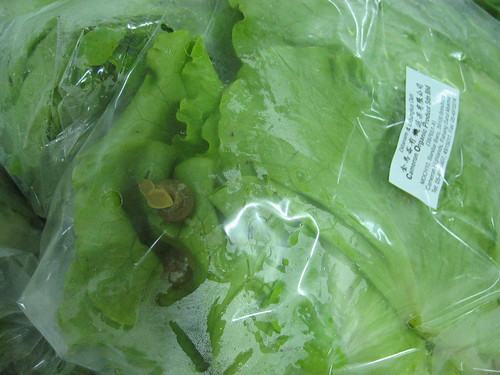Just in case I really need to go to Berkeley, I think I need to go do a statistics class this semester. S/U shouldn't be a problem right? Choose one that is useful to my current research as well. That should be good.
The downside about Berkeley is that there is no guaranteed amount of fellowship available. I need to apply apply and apply, unlike Yale. Bah. Money seems to be hard at Berkeley. 18,000/year for the fellowship. Well it's as simple as this - if no money, no go lor. The faculty is also somewhat lack lustre.
"We make every effort to support our entering and continuing students from a variety of resources including University Fellowships, Departmental Restricted Fellowships, and Graduate Student Research Assistantships (GSRs). We also encourage our students to apply for Graduate Student Instructor (GSI) positions. We make our financial support offers at the time of admission."
On the other hand, the relevant faculty all seem to be women! Possible ones under the Division of Society & Environment in the Department of Env Sci, Policy and Management in the College of Natural Resources include:
Sally Fairfax
Professor, Henry J. Vaux Distinguished Professor of Forest Policy
"the role of artisenal agricultural production as an element of land conservation in a transforming rural economy. I am personally focusing on cheese and dairy, and organic production generally."
Nancy Lee Peluso
Professor, Society & Environment Chair
Sociologist / Anthropologist working with Peter Vandergeest on Malaysia / Thailand / Indonesia on forest and agrarian politics
- the Indonesian powerhouse and Berkeley ChATSEA fella, OG aka Pak Api, is working with Peluso. Sigh. I'm intimidated.
Jeffrey Romm
Professor
"Our group studies how the dynamics of social distribution, economic growth, and ecosystems interact and respond to alternative forms of policy and organization." Works on Southeast Asia as well but focuses more on specific projects and phenomenon as well as impacts of policies on resources and environmental possibilities.
Alastair T Iles
Asst Professor (PhD in Env Law and Policy)
Works on sustainable industry and consumption as well as sustainability learning. Working on developing tools to educate consumers, etc. This could really be something I want to move into.
Dara O'Rourke
Assoc Professor (PhD in Energy and Resources)
Works on Environmental, Social and Equity impacts of global production system. Again, some what relevance to what I am doing now.
David E Winickoff
Asst Professor (Trained in Law)
Bioethics, representations, institution governing of food, etc.
Funding in the Geography department in Berkeley on the other hand, appears to be a lot more encouraging. However, the professors are seriously limited.
Louise Fortmann
Professor of Environmental Science, Policy and Management and Geography
However she works in Africa mainly although some of the topics seems quite interesting. Natural resources related of course.
Gillian Hart
Chair of Undergraduate Major in Development Studies
Works in Southeast Asia and Africa on gender, development and agrarian issues.
On top of that, she is also a ChATSEA advisor!!! Ok this is good potential.
Jake Kosek
Assistant Professor
If I want to move into critical theory stuff then this is probably it. Also very active in NGO outside academia so maybe can relate a bit better to each other but I'm not sure I want to be so airy fairy. And to work with an Asst Prof!
Richard Walker
Professor; Chair, California Studies Center
If I want to venture into the realm of economic geography and california studies, this will be it probably. He reminds me of some professors we know...
Michael J. Watts
Professor
He's doing oil and islam terrorism but also in social and cultural theories and development. Marxist theories and what not. If I really want to go into my theoretical track, why not? But I might not be cut out for it. I don't know.
One thing I learnt by looking through other people's research topic is the idea of "alternative paradigms and alternative systems". Also Fortmann's name keep popping up at the ones where I'm interested in. Peluso as well. Hart is also on my radar. Why all women? Hmmm
Saturday, June 28, 2008
Expect the Unexpected
For those who might be coming to help out in Cameron, here's the heads up - Expect the Unexpected!
You may need to babysit.
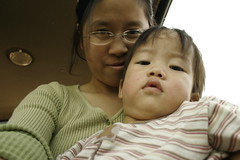
You will need to climb up hills and terraces.
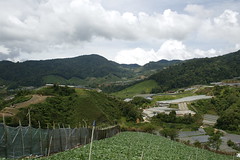
You may see deforestation.
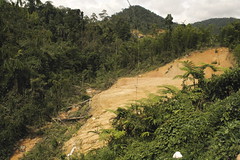
You will cross rivers.
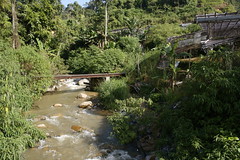
You may need to speak more than 4 languages in one day.
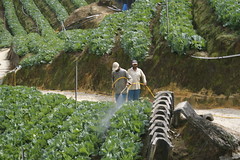
(and be careful not to get pesticide poisoning!)
You might end up on a road trip to KL in a cold truck.
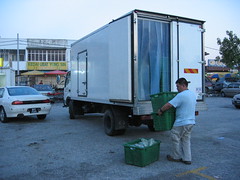
You might eat breakfast with dead rats.
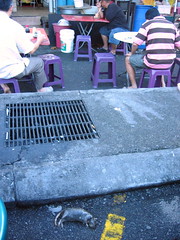
(Ok this is not in Cameron)
You may encounter destruction.
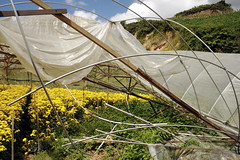
You may see ravines of disposed waste.
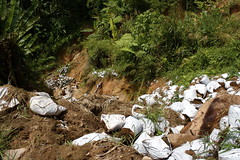
You will encounter lots of dogs.

You might have to climb on tractors to hide from rain.
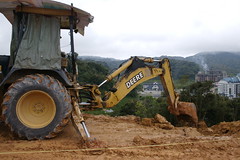
(I had to do that coz we were stuck on eroding hill in the rain and couldnt get down but in turn got a farmer contact w00t!)
You may need to babysit.

You will need to climb up hills and terraces.

You may see deforestation.

You will cross rivers.

You may need to speak more than 4 languages in one day.

(and be careful not to get pesticide poisoning!)
You might end up on a road trip to KL in a cold truck.

You might eat breakfast with dead rats.

(Ok this is not in Cameron)
You may encounter destruction.

You may see ravines of disposed waste.

You will encounter lots of dogs.

You might have to climb on tractors to hide from rain.

(I had to do that coz we were stuck on eroding hill in the rain and couldnt get down but in turn got a farmer contact w00t!)
Saturday, June 21, 2008
My vegetable delivery adventure
Singapore's global quest for wholesome food
Mooncakes, curry and...
Dr Chua Sin Bin is gatekeeper of the vast supply of food entering Singapore. He and his team help ensure food is safe and affordable.
Lee Siew Hua, Straits Times 20 Jun 08;
SALTED eggs nearly disappeared from mooncakes in Singapore last year.
A red alert on curry in Britain started it all. The authorities there found in 2005 that curry had been tinted - tainted - a rich orangey-red with Sudan Red, a dirt-cheap industrial dye used in lacquer and shoe polish.
When Singapore's food sleuths at the Agri-Food and Veterinary Authority (AVA) learnt of this, they wondered what could go awry in this part of the world.
AVA chief executive Chua Sin Bin, 61, tells Insight: 'We know the practice of feeding carotene to chicken to get the orangey-red colour in yolks.'
This is a natural food dye from carrot and red capsicum.
On a hunch, they tested shipments of salted eggs and century eggs. Sure enough, some farmers had substituted safe carotene for cancer-causing Sudan Red in chicken and duck feed to achieve vivid golden yolks.
'Some smart guys had tried to take a short cut,' says Dr Chua.
So 2.2 million eggs were suspended from sale, mostly from China. Others came from Malaysia, Vietnam and Taiwan.
Result: Singapore celebrated the Mid-autumn Festival last September a little differently when yolks nearly disappeared from mooncakes.
The eggs have since made a comeback, with health certificates from exporters now made mandatory.
'It's very simple. They stop, that's the end of it.'
From farm to fork
DR CHUA'S egg story illustrates how the agency operates as guardian of the national pantry. The watchdog role is vital in a land that imports 90 per cent of its food.
Earlier this month, AVA ordered a ban on the import of three tomato varieties from the United States after a salmonella outbreak there.
'Our biggest challenge,' Dr Chua says, 'is how to keep food safe in the face of an ever-increasing list of known and emerging food-borne hazards.'
Reaction time is crunched in a greatly connected world. 'What happens tens of thousands of kilometres away can appear on our shores in the blink of an eye,' he notes, making a 'keen sense of anticipation' a requirement at all times.
The AVA has to make rapid decisions to remove hazards from the food chain, relying on its assessments of the latest information, and its good institutional knowledge.
Nothing escapes the eyes of the agency, declares Dr Chua, who started his career as a veterinary officer in 1971. The AVA was then the Primary Production Department.
He rose through the ranks before becoming deputy chief executive in 2000 and CEO five years later.
The AVA scrutinises the entire food production chain or, in Dr Chua's words, 'from the farm to the fork'.
For instance, AVA officers visit farms to inspect facilities before deciding whether they should be accredited as approved suppliers.
They try to discern if someone farms intelligently - or is susceptible to chemical salesmen who push unsafe pesticides.
'One glance and we've a very good sense of whether a plant is practising hygienic methods or it is only putting on a show for us on that day,' he says.
AVA has approved 26 countries to export meat here. Countries are 'risk-profiled' based on their regulatory systems and other such factors.
Australia and New Zealand are first-rate in safety, says Dr Chua.
Last year, the AVA inspected a total of 89,231 consignments from across the world. Only 527 were rejected.
The importer, he believes, shares the onus of bringing in safe food. 'We must make it very clear to them that this is our standard,' he says.
China food scares
EXPORTS from China have been in the spotlight. Singapore, Japan, the Philippines, the US and European nations have taken action over a range of food items, including Maling brand canned luncheon meat containing a banned antibiotic, White Rabbit sweets and frozen dumplings.
Dr Chua says: 'Our reputation in China is that Singapore is a very stringent country.
'We have a very robust inspection system, and China's exporting establishments know they can't get past that if they don't do a good job. They know what we want. Over the years, they've realised we mean business.'
With multitudes of manufacturers and businessmen clamouring to export and earn foreign exchange, China's regulatory and quality-control machinery have had trouble keeping pace with the huge export drive.
In the old days, there was a single state exporter, Cofco, or the Cereals, Oil and Foodstuff Corporation.
'It had a lot of control over the establishments that produced food. It chose the best for export,' he says.
Still, there are comforting aspects to China's export mania: the latter has led China to be very serious about agricultural development.
Very big farms now tap technology and hire scientists, mostly PhDs in agriculture, says Dr Chua.
In reality, China is not a major supplier to Singapore, especially for meat and fish.
It plays a bigger role in vegetables, and accounts for about 30 per cent of Singapore's imports of these.
Even as the AVA confronts global food scares, it has a plateful of other trends to watch.
For instance, more Singaporeans are turning to organic food, and they don't want chemical fertilisers. The question is, where do farmers find organic fertilisers?
He recounts an incident in Canada in the 1980s, when many expectant mothers lost their foetuses after eating coleslaw tainted with bacteria.
This was traced to cabbage grown on organic farms fertilised with manure from bacteria-bearing sheep.
For the AVA, this means it has to be fully cognisant of agricultural practices in many countries.
Learning from Prima Deli
AT HOME, the Prima Deli episode shows how painful any slip-up can be.
Last year, more than 100 people suffered food poisoning after eating the bakery's cakes.
Prima Deli is a good plant, and used to be highly rated as a Category A outfit, he says, citing its internal controls and food technologists.
'But a factory can slip up, for instance, if they bring in new workers,' he says. 'Workers may not be fully trained. Some become complacent.'
Two lessons the AVA has conveyed to the industry are that workers cannot slacken, and products must be tested every day.
'It must be drummed into the worker that everyone counts, and every step he takes counts,' he says.
More food ahead
AS MUCH as food should be safe, there must be enough of it.
There is gathering global concern that the world must increase its food production.
This message was urgently conveyed to world leaders on June 2, during a Rome summit on the food crisis led by the UN Food and Agriculture Organisation.
The AVA has several strategies to keep the food supply resilient. It continually scours the globe for new and diverse food sources.
Its position on genetically modified (GM) food is one illuminating aspect, for it opens another door to supplies.
'Our view is that genetically modified products have gone through very thorough evaluation before they are safe enough for the marketplace,' he says.
After all, 'human beings have been cross-breeding plants, animals and fish for generations', he argues.
'GM is just a method of accelerating production. It is not creating anything so vastly different. It accelerates the process by pinpointing which gene to keep.'
Singapore consumes GM soya beans and corn.
On another front, the AVA is 're-assessing' how much food Singapore can produce locally.
With competing demands for land, it is really not easy to ramp up production. The ideal is to create niches powered by technology, such as the automation of goat-milk farms.
'As long as our private sector can find the land and find it economical to farm, we will give them all the support,' he promises.
After all, Singaporeans prefer locally produced food, he says. 'They are willing to pay more, and our production technology is good.'
Today, the nation grows 10 per cent of its vegetables. He thinks this can increase.
The next big idea is for companies to invest in overseas farms.
Meanwhile, what does the man who wields such influence over the national platter eat when he's at home?
'My wife uses very simple cooking methods like blanching. Occasionally, she stir-fries. So you can see the kitchen is very clean, no oil.'
Every evening, half their dinner is composed of fruits.
But he does not obsessively cut out fat. Go for 'good fat', he says, such as olive oil.
And when the couple eat at restaurants, they ask the cooks to skip the MSG, use less salt - 'and be gentle in their cooking'.
That sounds very much like the man and his mission - a gentle leader who's forceful with all that is unwholesome.
How to ensure supply: Invest in farms overseas?
Lee Siew Hua, Straits Times 20 Jun 08;
WILL this be the next big idea in Singapore's pursuit of abundant food: Investing in farms overseas to better control the stability and safety of Singapore's food supply?
Dr Chua Sin Bin, chief executive of the Agri-Food and Veterinary Authority (AVA), is an ardent advocate of this move, and says it flows with the Government's perpetual search for 'new sources' of food supply.
The Government, he says, will help pave the way for private-sector companies interested in investing in farms - and farm zones - overseas, although the investments must ultimately be driven by the private sector itself.
Farm zones integrate logistics, technology, farmer coaching, distribution and other vital expertise. This way, farmers can cater better to Singaporean food preferences.
The right expertise will also keep food fresh as it makes its way from possibly remote regional farms to the discerning diner in Singapore.
The AVA, says Dr Chua, will manage cross-border and quarantine issues, iron out technical quirks, and work with industry to make this a reality.
It will also work with regional authorities on land leases, help build their quality- assurance schemes, and open access to Singapore markets.
'We will engender an atmosphere of confidence,' declares Dr Chua.
Opportunities lie especially in fish, vegetable and fruit farms in the region.
Mr Roger Yeo, chief executive of Singapore Food Industries, a diversified food business whose businesses include distribution, processing and catering, is open to the idea.
'We have always stated our interest and intent to look upstream,' he says.
The company brings in 15 to 20 per cent of Singapore's imported meat, so that is a natural platform for farm ventures.
But not all are convinced. NTUC FairPrice is clear that it 'does not plan to move in the upstream direction'.
Its managing director Seah Kian Peng says: 'We will focus on our strength as Singapore's largest supermarket retailer.'
Instead of taking financial stakes in farms in the region, FairPrice works on a system 'akin to contract farming' with certain producers in Thailand, Malaysia and Indonesia, he says. It offers certainty to these producers with guaranteed orders.
The Dairy Farm group, which owns the Cold Storage and Giant supermarket chains, similarly plans to focus on retailing.
One possible obstacle that farm investors could face is the same nationalist sentiment that bedevilled Singapore companies' investments in telecommunications in Indonesia.
The AVA's Dr Chua is mindful of the difficulties even as he urges investors to head into the region. 'Agriculture investment is for the long term - it takes a long time for payback.'
He points out, however, that investors will have technology and a successful Indonesian model on their side.
Already, there are farms in the land-rich Riau province in Indonesia which grow vegetables that sell in Singapore.
Owned by Indonesians, these farms have benefited from technology transfer from the AVA since 2001.
Some measures include netting to keep vegetables resistant to pests and weather while they are growing, and cool-packing houses to keep vegetables fresh after they are harvested.
There are also chiller-fitted boats for the 20-hour journey to Singapore, and refrigerated trucks waiting in Singapore to rush the greens to supermarkets.
'The vegetables arrive in Singapore in great condition,' Dr Chua says. 'They are flying off the shelves in FairPrice.'
Dr Chua Sin Bin is gatekeeper of the vast supply of food entering Singapore. He and his team help ensure food is safe and affordable.
Lee Siew Hua, Straits Times 20 Jun 08;
SALTED eggs nearly disappeared from mooncakes in Singapore last year.
A red alert on curry in Britain started it all. The authorities there found in 2005 that curry had been tinted - tainted - a rich orangey-red with Sudan Red, a dirt-cheap industrial dye used in lacquer and shoe polish.
When Singapore's food sleuths at the Agri-Food and Veterinary Authority (AVA) learnt of this, they wondered what could go awry in this part of the world.
AVA chief executive Chua Sin Bin, 61, tells Insight: 'We know the practice of feeding carotene to chicken to get the orangey-red colour in yolks.'
This is a natural food dye from carrot and red capsicum.
On a hunch, they tested shipments of salted eggs and century eggs. Sure enough, some farmers had substituted safe carotene for cancer-causing Sudan Red in chicken and duck feed to achieve vivid golden yolks.
'Some smart guys had tried to take a short cut,' says Dr Chua.
So 2.2 million eggs were suspended from sale, mostly from China. Others came from Malaysia, Vietnam and Taiwan.
Result: Singapore celebrated the Mid-autumn Festival last September a little differently when yolks nearly disappeared from mooncakes.
The eggs have since made a comeback, with health certificates from exporters now made mandatory.
'It's very simple. They stop, that's the end of it.'
From farm to fork
DR CHUA'S egg story illustrates how the agency operates as guardian of the national pantry. The watchdog role is vital in a land that imports 90 per cent of its food.
Earlier this month, AVA ordered a ban on the import of three tomato varieties from the United States after a salmonella outbreak there.
'Our biggest challenge,' Dr Chua says, 'is how to keep food safe in the face of an ever-increasing list of known and emerging food-borne hazards.'
Reaction time is crunched in a greatly connected world. 'What happens tens of thousands of kilometres away can appear on our shores in the blink of an eye,' he notes, making a 'keen sense of anticipation' a requirement at all times.
The AVA has to make rapid decisions to remove hazards from the food chain, relying on its assessments of the latest information, and its good institutional knowledge.
Nothing escapes the eyes of the agency, declares Dr Chua, who started his career as a veterinary officer in 1971. The AVA was then the Primary Production Department.
He rose through the ranks before becoming deputy chief executive in 2000 and CEO five years later.
The AVA scrutinises the entire food production chain or, in Dr Chua's words, 'from the farm to the fork'.
For instance, AVA officers visit farms to inspect facilities before deciding whether they should be accredited as approved suppliers.
They try to discern if someone farms intelligently - or is susceptible to chemical salesmen who push unsafe pesticides.
'One glance and we've a very good sense of whether a plant is practising hygienic methods or it is only putting on a show for us on that day,' he says.
AVA has approved 26 countries to export meat here. Countries are 'risk-profiled' based on their regulatory systems and other such factors.
Australia and New Zealand are first-rate in safety, says Dr Chua.
Last year, the AVA inspected a total of 89,231 consignments from across the world. Only 527 were rejected.
The importer, he believes, shares the onus of bringing in safe food. 'We must make it very clear to them that this is our standard,' he says.
China food scares
EXPORTS from China have been in the spotlight. Singapore, Japan, the Philippines, the US and European nations have taken action over a range of food items, including Maling brand canned luncheon meat containing a banned antibiotic, White Rabbit sweets and frozen dumplings.
Dr Chua says: 'Our reputation in China is that Singapore is a very stringent country.
'We have a very robust inspection system, and China's exporting establishments know they can't get past that if they don't do a good job. They know what we want. Over the years, they've realised we mean business.'
With multitudes of manufacturers and businessmen clamouring to export and earn foreign exchange, China's regulatory and quality-control machinery have had trouble keeping pace with the huge export drive.
In the old days, there was a single state exporter, Cofco, or the Cereals, Oil and Foodstuff Corporation.
'It had a lot of control over the establishments that produced food. It chose the best for export,' he says.
Still, there are comforting aspects to China's export mania: the latter has led China to be very serious about agricultural development.
Very big farms now tap technology and hire scientists, mostly PhDs in agriculture, says Dr Chua.
In reality, China is not a major supplier to Singapore, especially for meat and fish.
It plays a bigger role in vegetables, and accounts for about 30 per cent of Singapore's imports of these.
Even as the AVA confronts global food scares, it has a plateful of other trends to watch.
For instance, more Singaporeans are turning to organic food, and they don't want chemical fertilisers. The question is, where do farmers find organic fertilisers?
He recounts an incident in Canada in the 1980s, when many expectant mothers lost their foetuses after eating coleslaw tainted with bacteria.
This was traced to cabbage grown on organic farms fertilised with manure from bacteria-bearing sheep.
For the AVA, this means it has to be fully cognisant of agricultural practices in many countries.
Learning from Prima Deli
AT HOME, the Prima Deli episode shows how painful any slip-up can be.
Last year, more than 100 people suffered food poisoning after eating the bakery's cakes.
Prima Deli is a good plant, and used to be highly rated as a Category A outfit, he says, citing its internal controls and food technologists.
'But a factory can slip up, for instance, if they bring in new workers,' he says. 'Workers may not be fully trained. Some become complacent.'
Two lessons the AVA has conveyed to the industry are that workers cannot slacken, and products must be tested every day.
'It must be drummed into the worker that everyone counts, and every step he takes counts,' he says.
More food ahead
AS MUCH as food should be safe, there must be enough of it.
There is gathering global concern that the world must increase its food production.
This message was urgently conveyed to world leaders on June 2, during a Rome summit on the food crisis led by the UN Food and Agriculture Organisation.
The AVA has several strategies to keep the food supply resilient. It continually scours the globe for new and diverse food sources.
Its position on genetically modified (GM) food is one illuminating aspect, for it opens another door to supplies.
'Our view is that genetically modified products have gone through very thorough evaluation before they are safe enough for the marketplace,' he says.
After all, 'human beings have been cross-breeding plants, animals and fish for generations', he argues.
'GM is just a method of accelerating production. It is not creating anything so vastly different. It accelerates the process by pinpointing which gene to keep.'
Singapore consumes GM soya beans and corn.
On another front, the AVA is 're-assessing' how much food Singapore can produce locally.
With competing demands for land, it is really not easy to ramp up production. The ideal is to create niches powered by technology, such as the automation of goat-milk farms.
'As long as our private sector can find the land and find it economical to farm, we will give them all the support,' he promises.
After all, Singaporeans prefer locally produced food, he says. 'They are willing to pay more, and our production technology is good.'
Today, the nation grows 10 per cent of its vegetables. He thinks this can increase.
The next big idea is for companies to invest in overseas farms.
Meanwhile, what does the man who wields such influence over the national platter eat when he's at home?
'My wife uses very simple cooking methods like blanching. Occasionally, she stir-fries. So you can see the kitchen is very clean, no oil.'
Every evening, half their dinner is composed of fruits.
But he does not obsessively cut out fat. Go for 'good fat', he says, such as olive oil.
And when the couple eat at restaurants, they ask the cooks to skip the MSG, use less salt - 'and be gentle in their cooking'.
That sounds very much like the man and his mission - a gentle leader who's forceful with all that is unwholesome.
How to ensure supply: Invest in farms overseas?
Lee Siew Hua, Straits Times 20 Jun 08;
WILL this be the next big idea in Singapore's pursuit of abundant food: Investing in farms overseas to better control the stability and safety of Singapore's food supply?
Dr Chua Sin Bin, chief executive of the Agri-Food and Veterinary Authority (AVA), is an ardent advocate of this move, and says it flows with the Government's perpetual search for 'new sources' of food supply.
The Government, he says, will help pave the way for private-sector companies interested in investing in farms - and farm zones - overseas, although the investments must ultimately be driven by the private sector itself.
Farm zones integrate logistics, technology, farmer coaching, distribution and other vital expertise. This way, farmers can cater better to Singaporean food preferences.
The right expertise will also keep food fresh as it makes its way from possibly remote regional farms to the discerning diner in Singapore.
The AVA, says Dr Chua, will manage cross-border and quarantine issues, iron out technical quirks, and work with industry to make this a reality.
It will also work with regional authorities on land leases, help build their quality- assurance schemes, and open access to Singapore markets.
'We will engender an atmosphere of confidence,' declares Dr Chua.
Opportunities lie especially in fish, vegetable and fruit farms in the region.
Mr Roger Yeo, chief executive of Singapore Food Industries, a diversified food business whose businesses include distribution, processing and catering, is open to the idea.
'We have always stated our interest and intent to look upstream,' he says.
The company brings in 15 to 20 per cent of Singapore's imported meat, so that is a natural platform for farm ventures.
But not all are convinced. NTUC FairPrice is clear that it 'does not plan to move in the upstream direction'.
Its managing director Seah Kian Peng says: 'We will focus on our strength as Singapore's largest supermarket retailer.'
Instead of taking financial stakes in farms in the region, FairPrice works on a system 'akin to contract farming' with certain producers in Thailand, Malaysia and Indonesia, he says. It offers certainty to these producers with guaranteed orders.
The Dairy Farm group, which owns the Cold Storage and Giant supermarket chains, similarly plans to focus on retailing.
One possible obstacle that farm investors could face is the same nationalist sentiment that bedevilled Singapore companies' investments in telecommunications in Indonesia.
The AVA's Dr Chua is mindful of the difficulties even as he urges investors to head into the region. 'Agriculture investment is for the long term - it takes a long time for payback.'
He points out, however, that investors will have technology and a successful Indonesian model on their side.
Already, there are farms in the land-rich Riau province in Indonesia which grow vegetables that sell in Singapore.
Owned by Indonesians, these farms have benefited from technology transfer from the AVA since 2001.
Some measures include netting to keep vegetables resistant to pests and weather while they are growing, and cool-packing houses to keep vegetables fresh after they are harvested.
There are also chiller-fitted boats for the 20-hour journey to Singapore, and refrigerated trucks waiting in Singapore to rush the greens to supermarkets.
'The vegetables arrive in Singapore in great condition,' Dr Chua says. 'They are flying off the shelves in FairPrice.'
Thursday, June 19, 2008
Late night Starbucks encounter
2 nights ago, I got a call at 10pm. It was the organic farmer that I was meant to meet the next day.
"Hey we are at Starbucks with a few of the organic guys, why don't you and your friend come and join us".
It was quite unfortunate that my friend was ill and I was worried that they were only interested in meeting her. Still I went and they of course said no problem.
2 of them were farmers and the other 2 were urbanites who have gone into the composting business. Young fellas, with kids the same age as my niece and nephew. They were all about 30somethings like my sisters. It feels all so familiar. Interestingly one of them have the same name as duck! But luckily he felt compelled to distinguish himself by spelling his name with a K. hah!
The organic fellowship. At starbucks! That is the irony. I'm really not a fan of starbucks but upon hearing that theres FREE WIFI at starbucks. Well bing bam boom kabooey! I am a fan. hah! Right that and the fact that they have nice cushy sofas. What I didn't understand is why they need fans and aircon on Cameron Highlands! Probably standard issues with the mold that is global-franchising.
The organic fellas really make me feel right at home on Cameron Highlands. I know it's very foolish of me to want to not be rejected when approaching people for interview but being snubbed hurts. But then the boss says just go get snubb anyways. That makes me wonder if I shouldn't try so hard to persuade people? Confused. Maybe I'll leave the high snub zones to the boys when they come in late July.
Methodologically this is probably all wrong since I should do the survey then choose 30 out of the 100 to do the indepth but now I have to do the indepth as I go along and survey enough to fill in the blanks. It will be hard for me to get 2nd meetings with people unless I have something I need and I'm desperate. Sometimes just getting a 2nd chance to invite somebody out to dinner is difficult. It's hard to draw a clear distinction between social and work when it comes to fieldwork.

Taken 1 month ago, now it's already open for business!
Will remember to take an updated photo
But I'll never forget starbucks. The way I see it now, I will probably focus my thesis on the holistic picture and separately write a paper on organic farming in Cameron Highlands.
"Hey we are at Starbucks with a few of the organic guys, why don't you and your friend come and join us".
It was quite unfortunate that my friend was ill and I was worried that they were only interested in meeting her. Still I went and they of course said no problem.
2 of them were farmers and the other 2 were urbanites who have gone into the composting business. Young fellas, with kids the same age as my niece and nephew. They were all about 30somethings like my sisters. It feels all so familiar. Interestingly one of them have the same name as duck! But luckily he felt compelled to distinguish himself by spelling his name with a K. hah!
The organic fellowship. At starbucks! That is the irony. I'm really not a fan of starbucks but upon hearing that theres FREE WIFI at starbucks. Well bing bam boom kabooey! I am a fan. hah! Right that and the fact that they have nice cushy sofas. What I didn't understand is why they need fans and aircon on Cameron Highlands! Probably standard issues with the mold that is global-franchising.
The organic fellas really make me feel right at home on Cameron Highlands. I know it's very foolish of me to want to not be rejected when approaching people for interview but being snubbed hurts. But then the boss says just go get snubb anyways. That makes me wonder if I shouldn't try so hard to persuade people? Confused. Maybe I'll leave the high snub zones to the boys when they come in late July.
Methodologically this is probably all wrong since I should do the survey then choose 30 out of the 100 to do the indepth but now I have to do the indepth as I go along and survey enough to fill in the blanks. It will be hard for me to get 2nd meetings with people unless I have something I need and I'm desperate. Sometimes just getting a 2nd chance to invite somebody out to dinner is difficult. It's hard to draw a clear distinction between social and work when it comes to fieldwork.

Taken 1 month ago, now it's already open for business!
Will remember to take an updated photo
But I'll never forget starbucks. The way I see it now, I will probably focus my thesis on the holistic picture and separately write a paper on organic farming in Cameron Highlands.
Teaching modules next sem
I was looking at the list of modules offered next sem and saw many new faculty listed. It seems like the 2 new physical geography positions have been offered to James Terry and Alan Ziegler. I wonder what of CC Feng? How confusing. Only time will tell. There are also some new visitings including one teaching topics in petroleum science! So upsetting :( We have finally been reduced to money grabbing oil geologists.
On the other hand, I think I shall stick to TA-ing modules I am familiar with such as Nature and Society. Second choice would be Southeast Asia because having spend a summer working with Southeast Asianists and working in Southeast Asia, I feel confident. Then finally I wouldn't mind doing Changing Landscape again... I suppose. It'll be too soon to tell but I rather do Nature and Society above all. For Southeast Asia, Victor already asked me to stand in for the first lecture so that would be enough to satisfy my Southeast needs.
I'm kinda disappointed that for my last semester, I will be going away and unable to teach. Sigh. I do love teaching so much. In the university at least. So much more room for sharing information and diversity in topics. It's oh-so-boring to teach the basics. There is a new module called Planet Earth. That sounds interesting. I wouldn't mind sitting in on that myself! :)
On the other hand, I think I shall stick to TA-ing modules I am familiar with such as Nature and Society. Second choice would be Southeast Asia because having spend a summer working with Southeast Asianists and working in Southeast Asia, I feel confident. Then finally I wouldn't mind doing Changing Landscape again... I suppose. It'll be too soon to tell but I rather do Nature and Society above all. For Southeast Asia, Victor already asked me to stand in for the first lecture so that would be enough to satisfy my Southeast needs.
I'm kinda disappointed that for my last semester, I will be going away and unable to teach. Sigh. I do love teaching so much. In the university at least. So much more room for sharing information and diversity in topics. It's oh-so-boring to teach the basics. There is a new module called Planet Earth. That sounds interesting. I wouldn't mind sitting in on that myself! :)
Going to KL at 2am
The girls left to go back to Singapore this morning and I met with Mr Ch and had a nice and lengthy interview with him. I'm very pleased. He also gave me a few numbers to call the tomato plantations whom I spotted on the boxes of tomatoes in Singapore.
He also gave me the numbers of several members in the assocation that I hope to call regarding cabbage. Malay farmers next week and indian farmers to follow. There was recently this "expose" on a farm in Cameron Highlands "illegally" clearing land. Gah. There is a lot of loopholes with legality. Either you get away with it or you get pinned down for something you didn't do. Life sucks.
Either way, I was hoping to talk to this farm even before they were featured. Now I just got more work to do to convince them I'm harmless. Damn press. Spoil my market! Fortunately I talked to his consultant yesterday and got the story.
So tomorrow I'm going to KL with the organic farmer to deliver vegetables. I'm excited. We are leaving at 2am. I better go back and nap now.
On the other hand, I was getting very despondent about being rejected but prof say rejected also is a result. So I have to go get rejected 10 times.
10 x Tomato
10 x Cabbage
10 x Big
10 x Small
10 x Chinese
10 x Malay
10 x Indian
10 x Singapore
10 x Non-Singapore
10 x Organic
But so many of them overlap. Does it matter then? I need 15 cabbage and 15 tomatoes total.
I also need to go check out the collectors, exporters, transporters, input sales people - fertilizers, seeds, infrastructure, pesticides shops.
I'm also having serious issues with getting climate data and map. I'm going to try again... wish me luck. Hope they like me. Or I just pay more $$$
Speaking of which I have been wanting to treat my respondents to lunch or dinner but I keep getting treated instead! omfg! First of all, I'm female. It's hard for them to accept being treated by me. Then I'm younger. Then I'm a guest from Singapore. Omfg! I really need to push my way and start treating people makan! It's so cheap anyways. Oh right at least my driver has totally stopped resisting me paying for everything. Gawd the petrol is fucking expensive. More than 100RM for a full tank or something. Sigh. I'm so glad I'm not using the car everyday. I hope I can claim back everything.
Need to ask AVA on what their pesticides list is based on. Do they update their list when there are new pesticides introduce? Why yes, why not? How often? Based on what? Based on who? Whose standards?
He also gave me the numbers of several members in the assocation that I hope to call regarding cabbage. Malay farmers next week and indian farmers to follow. There was recently this "expose" on a farm in Cameron Highlands "illegally" clearing land. Gah. There is a lot of loopholes with legality. Either you get away with it or you get pinned down for something you didn't do. Life sucks.
Either way, I was hoping to talk to this farm even before they were featured. Now I just got more work to do to convince them I'm harmless. Damn press. Spoil my market! Fortunately I talked to his consultant yesterday and got the story.
So tomorrow I'm going to KL with the organic farmer to deliver vegetables. I'm excited. We are leaving at 2am. I better go back and nap now.
On the other hand, I was getting very despondent about being rejected but prof say rejected also is a result. So I have to go get rejected 10 times.
10 x Tomato
10 x Cabbage
10 x Big
10 x Small
10 x Chinese
10 x Malay
10 x Indian
10 x Singapore
10 x Non-Singapore
10 x Organic
But so many of them overlap. Does it matter then? I need 15 cabbage and 15 tomatoes total.
I also need to go check out the collectors, exporters, transporters, input sales people - fertilizers, seeds, infrastructure, pesticides shops.
I'm also having serious issues with getting climate data and map. I'm going to try again... wish me luck. Hope they like me. Or I just pay more $$$
Speaking of which I have been wanting to treat my respondents to lunch or dinner but I keep getting treated instead! omfg! First of all, I'm female. It's hard for them to accept being treated by me. Then I'm younger. Then I'm a guest from Singapore. Omfg! I really need to push my way and start treating people makan! It's so cheap anyways. Oh right at least my driver has totally stopped resisting me paying for everything. Gawd the petrol is fucking expensive. More than 100RM for a full tank or something. Sigh. I'm so glad I'm not using the car everyday. I hope I can claim back everything.
Need to ask AVA on what their pesticides list is based on. Do they update their list when there are new pesticides introduce? Why yes, why not? How often? Based on what? Based on who? Whose standards?
Monday, June 16, 2008
And fieldwork begins
The bus was late for 2 hours yesterday but we managed to arrive at Cameron at around 9.15am this morning. Mr C picked us up and we went for breakfast. Gave me a few updates regarding subsidies and TV 3 reporting that somebody was secretly clearing land in the forest in CH! I wonder where I can get a copy of that. There is a department of environment that is supposed to monitor these things but I wonder if I can get them to talk to me. We also talked about soil conservation method - they have an officer in charge of soil conservation and there are vegetative and other methods. interesting. but they are giving away the grass for free because nobody wants! "only when you have to pay for it then people want?" This grass has a 3 meter root that is meant to be planted along the contours of the land to intercept runoff and hold the soil together. Apparently last time the older farms that uses terracing has better drains that is much more effective in terms of soil conservation but then the new concept in the 70s-80s which is to level the land to have a flat ground to plant more, that created a lot of problems. Also it is now technically illegal to use any heavy machinery on anything above 1000m in the whole of Malaysia. But how much of it is enforced? "Being on the take" is still a big issue. We talked about tracing and how the tagging might be a problem if the big boys tag for the small boys and then the small boys say they wanna tag what. So who bears the resposibility? In fact, "making things pass" when demand is short is something both wholesaler and farmers say happens even in the strict condition that is Singapore.
I gave Mr C a list of the farms I spotted at the wholesale center and if he doesn't know them then I will check with Mr Ch.
Interestingly my apartment situation has improved. I get 1 month in my first apartment and only for the last 2 weeks then we need to move. That will be convenient. I tried to get in touch with COP but then sms no reply. Maybe I should call.
I really need to be more prompt with my field notes. I'm sure there are other things I forgot about the chat this morning. crap!
I gave Mr C a list of the farms I spotted at the wholesale center and if he doesn't know them then I will check with Mr Ch.
Interestingly my apartment situation has improved. I get 1 month in my first apartment and only for the last 2 weeks then we need to move. That will be convenient. I tried to get in touch with COP but then sms no reply. Maybe I should call.
I really need to be more prompt with my field notes. I'm sure there are other things I forgot about the chat this morning. crap!
Subscribe to:
Posts (Atom)
